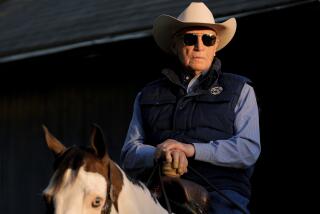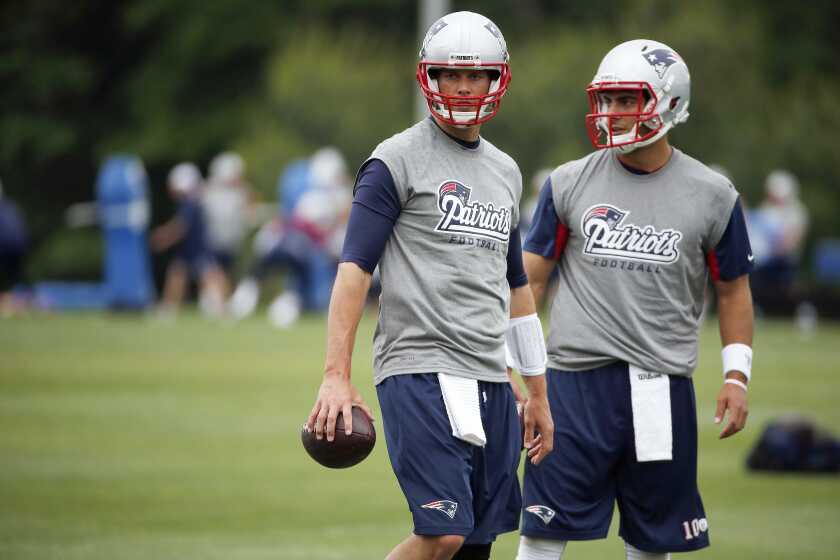Trainer Ron McAnally still has the fire after all these years
Ron McAnally is much like the famous horse he once trained. Neither he nor John Henry would be considered the retiring types.
John Henry raced effectively through his ninth year, 1984. That was unheard of even back then and unthinkable now. He was horse of the year at age 9.
McAnally will turn 80 next July and will probably celebrate by mucking out a stall.
“It’s my life, my whole life,” McAnally says. “I can’t get it out of my blood.”
He’s at the track every morning at 5:30.
“I wake up every morning at 4,” he says. “I don’t need an alarm clock. I wake up, look at the clock, and it almost always says 4 o’clock, right on the dot.”
McAnally is among those in horse racing who have achieved legendary status. He has trained horses since 1948, is approaching a career purse total of $125 million that puts him in the top 10 all-time, and has won three Eclipse Awards as the nation’s top trainer. In 1990, he was inducted into racing’s Hall of Fame.
Recent years have been lean ones. His last $1-million-plus winning season was 2008, and then he barely made it with $1,035,531. He is down to a stable of 15 horses now, or about one horse per person he still employs. He plans no staffing cutbacks. He has no stomach for the current trend of bloodless corporate employee-chopping.
“It’s costing me money,” he says, “but I just couldn’t do that. These people have been loyal for so long.”
He must compete with the 150-plus horse stables of the likes of Bob Baffert, John Sadler, Doug O’Neill and Mike Mitchell, not to mention the even larger Eastern operations of Steve Asmussen and Todd Pletcher.
But McAnally holds on to one theory of success, and it doesn’t always stem merely from quantity.
“Just give me the horse,” he says.
That’s what an owner named Sam Rubin, a man McAnally had never met, did in 1979. McAnally remembers that John Henry wasn’t much to look at, nor a warm and friendly animal. But Rubin had given him the horse, and there was quickly no question that he could run.
“When they shipped him here from the East,” McAnally recalls, “there was an airline strike and so he didn’t arrive until 4 a.m. They were shipping him for a specific race, and so he ran that same afternoon, about 4 p.m. And he won.”
When McAnally and John Henry were done, the durable gelding had amassed $6,597,547 in winnings and McAnally had received universal praise for his handling of this temperamental horse. McAnally’s success continued to grow after John Henry retired in 1984.
That success included four victories in Breeders’ Cup races, one of them a bittersweet moment that few in racing will ever forget. In the 1990 Distaff at Belmont Park, McAnally’s Bayakoa was involved in a classic stretch duel with another special filly named Go For Wand. Near the finish line, Go For Wand broke down and the horror of the moment for all those watching in person or on network TV remains vivid.
McAnally’s Bayakoa won her second straight Breeders’ Cup Distaff that day, and McAnally remembers wrestling with his emotions. He told network commentator Jim McKay that a horse such as Go For Wand “gave her all for our pleasure.” That quote became part of McKay’s legacy documentary.
Still, after all this, in a training career that has spanned eight decades, McAnally is looking for more. And now, he may have the horses.
His Charm the Maker won the Nov. 13 Sharp Cat Stakes, a $100,000 race at Hollywood Park, and has, according to McAnally, a chance to be special. He will enter her next in the Dec. 10 Hollywood Starlet, a Grade I race worth $250,000. And with success there, the sky’s the limit.
“Yes, maybe something like the Kentucky Oaks,” he says. “That’s possible. She’s that good.”
He also will be a busy participant in Hollywood Park’s Thanksgiving Weekend Turf Festival, with expected entries in Friday’s Matriarch with his All-Star Heart and in Saturday’s Citation, with Buenos Dias.
A couple of wins in races of this caliber can, once again, push some buttons for McAnally. More horses might be sent his way again, and more to train means more chances to win.
But even if his recent uptick is just temporary, he would be the first to say that horse racing has been everything to him and owes him no more. From the humble beginnings of a Kentucky orphanage, with two brothers and two sisters, to a Hall of Fame career in anything, is quite a rise.
“I could not have done it without my wife, Deborah,” he says. They have been married 39 years, and she is closely involved in his daily operation.
“When I met her, I had nothing,” McAnally says. “I had a feed bill for $30,000 that I couldn’t pay, and nothing else. I still have the letter they sent me, demanding the money. And I’m still using the same feed company.”
Now, in addition to Deborah, three daughters and five grandchildren, McAnally has five homes, all paid for, and a training career that seems about to be jump-started again. He can’t wait to keep going, to get up at 4 a.m., to get to the gym five days a week for work on the treadmill and the weights, to squeeze in his daily nap before getting back to the track to saddle his racers.
His motto is the same at 79 as it was at 30.
“Just give me the horse.”
More to Read
Go beyond the scoreboard
Get the latest on L.A.'s teams in the daily Sports Report newsletter.
You may occasionally receive promotional content from the Los Angeles Times.











